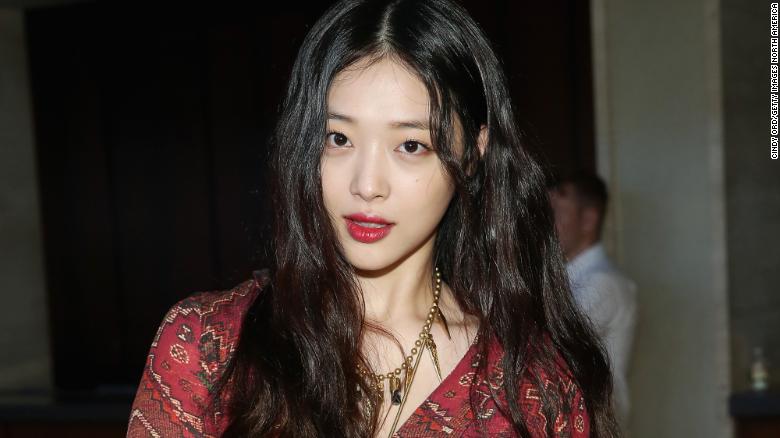Outpouring of grief over death of K-pop star Sulli

Those actions won 25-year-old K-pop singer Sulli praise — but also made her the subject of harsh online criticism. Now, a day after her apparent suicide, her death has prompted an outpouring of grief and calls to curb the cyber-bullying stars can be subject to when they stray outside the K-pop industry’s traditional norms. The body of the former member of girl group f(x) was discovered by her manager in her house in Sujeong-gu, Seongnam, south of the capital Seoul, on Monday afternoon local time, police told CNN. In a statement Tuesday, Sulli’s agency SM Entertainment said the star’s family was planning a private funeral, adding that relatives were “grief-stricken by this unexpected sad news.” According to the Seongnam Sujeong Police, a postmortem could be conducted as early as Wednesday. News of her death had an instant impact across the industry, with other SM Entertainment groups Super Junior and SuperM, as well as former f(x) bandmate Amber Liu, all announcing they would cancel upcoming events.From being candid about her own relationships — unusual in the world of K-pop, where stars are encouraged to keep quiet about romance — to being openly pro-choice and an advocate of the “free the nipple” movement, Sulli was known for subverting expectations of female K-pop stars. But her opinions often made her a target of online trolls, particularly by anti-feminists, said CedarBough Saeji, an expert in Korean culture and society at the University of British Columbia.”She was brave,” Saeji said on Tuesday. “The fact that Sulli repeatedly did things that misogynists didn’t like, and refused to apologize, is how she really stood out.” Saeji said that in South Korea, K-pop stars were expected to apologize publicly when they failed to meet the high — and sometimes unrealistic — standards expected by the industry. But Sulli refused to change, even appearing on a TV show that featured K-pop stars discussing the challenges of negative online comments.”That society would criticize her so heavily just for showing individuality in a way that did not conform exactly to Korean social norms, that’s just so incredibly sad,” Saeji said. “I’m so sorry that she didn’t have people supporting her in the same way that she was supporting — in her own quirky way — gender equality in Korea. She was also being a voice, and being a proponent, for larger issues in Korean society.”As of Tuesday, three petitions had been lodged on the Blue House petition site, all demanding tighter rules for cyber-bullying.South Korea’s entertainment industry has become one of the country’s biggest exports in the past decade. But K-pop stars — who often train for years before they debut — are subject to intense pressure, which has been linked to a mental health crisis in the industry.K-pop megastar Jonghyun, whose real name was Kim Jong-hyun, took his own life in Seoul in December 2017. And singer and actress Goo Hara, formerly part of girl band Kara, apologized to fans after being found unconscious at home in May 2019.The singer had posted the word “Goodbye” to her Instagram account, prompting a flood of comments from concerned fans.How to get help: In the US, call the National Suicide Prevention Lifeline at 1-800-273-8255. The International Association for Suicide Prevention and Befrienders Worldwide also provide contact information for crisis centers around the world.Yoonjung Seo and Shin Jae-eun reported from Seoul, South Korea, and Julia Hollingsworth wrote from Hong Kong.



